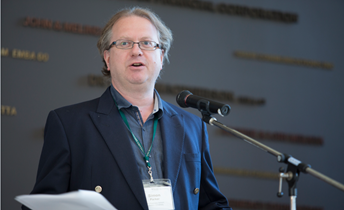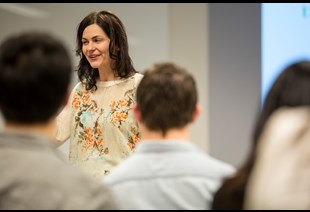While research can be classified as treading unchartered waters, very rarely does an institution get the opportunity to map out an entire ocean.
In the relatively young life of entrepreneurship as an academic discipline, the Ivey Business School has become a key leader and convener in the space. In 2017, Ivey will have the opportunity to continue that role and expand the conversation on social entrepreneurship.
Ivey’s Entrepreneurship Cross-Enterprise Leadership Centre (ECELC or Centre) and the Pierre L. Morrissette Institute for Entrepreneurship will host an academic conference on social entrepreneurship, bringing together many of the field’s top scholars and PhD researchers. The conference will pave the way for a Special Issue on the topic with the Journal of Business Venturing, the world’s leading entrepreneurship journal listed in the Financial Times 50 academic journal list.
A natural extension of Ivey’s Legacy of Leadership
 In 2011, the Centre launched a new initiative in partnership with Indiana University, University of Illinois, University of Minnesota, Ohio State University, Syracuse University and University of Wisconsin to set up the Great Lakes Entrepreneurship Network (GLEN). The GLEN is a forum for academics in the field to share ideas and research and is hosted bi-annually at one of the partner institutions. Ivey also hosted the prestigious Babson College Entrepreneurship Research Conference in 2014, becoming only the second Canadian institution in 26 years to host what is considered the “Olympics of entrepreneurship conferences.”
In 2011, the Centre launched a new initiative in partnership with Indiana University, University of Illinois, University of Minnesota, Ohio State University, Syracuse University and University of Wisconsin to set up the Great Lakes Entrepreneurship Network (GLEN). The GLEN is a forum for academics in the field to share ideas and research and is hosted bi-annually at one of the partner institutions. Ivey also hosted the prestigious Babson College Entrepreneurship Research Conference in 2014, becoming only the second Canadian institution in 26 years to host what is considered the “Olympics of entrepreneurship conferences.”
Following this legacy, the upcoming conference and special issue with the Journal of Business Venturing fits perfectly with the role Ivey has played in entrepreneurship research; a notion echoed by Professor Simon C. Parker, Centre Director and J. Allyn Taylor/Arthur H. Mingay Chair in Entrepreneurship.
“Being the focal place to bring the world’s thought leaders together to enlarge, enrich and advance the conversation, Ivey continues to plays a leadership role in shaping entrepreneurship research.”
Parker also serves on the editorial board of the Journal of Business Venturing along with Associate Professor Oana Branzei, Donald F. Hunter Professor of International Business, who is a leading global scholar in social entrepreneurship research. In 2008, Branzei founded Social Innovation @ Ivey, which made Ivey the first Canadian university to convene in the space.
“Social entrepreneurship is not the new kid on the block, but it’s something that has grown organically. Ivey leading in the space itself is a natural extension of its leadership in entrepreneurship,” said Branzei.
Mapping social entrepreneurship
Despite the emergence of a growing body of research on social entrepreneurship in recent years, the forthcoming Special Issue is the first concerted effort to map out new developments in the field. The issue will publish the most path-breaking papers presented at the conference, comprising seven articles and three editorials. These are expected to shape the future development of the field for years to come.
With the April 2017 conference, Parker and Branzei hope to attract more than 25 of the world’s leading scholars in the field, with an additional 25 doctoral students. The one-to-one ratio of scholars to students is unprecedented in most research conferences, and will maximize opportunities for mentorship and collaboration.
 While the conference topic is being framed in broader terms as the intersection of enterprise and society, Branzei and Parker are expecting quality paper applications relating to benefit corporations. Benefit corporations or B Corps are for-profit companies specially designed to pursue social goals as well as business ones.
While the conference topic is being framed in broader terms as the intersection of enterprise and society, Branzei and Parker are expecting quality paper applications relating to benefit corporations. Benefit corporations or B Corps are for-profit companies specially designed to pursue social goals as well as business ones.
“They have a blended mission that’s intrinsic to their identity and their purpose. This way they signal to consumers that their social mission will not be abandoned to make profits, but that profits increase if social impact increases,” said Parker.
The phenomenon has been gaining popularity in the past five years and today, there are over a 1,600 certified B corps in 42 countries according to the chief certifying body, B Lab.
“If you are going for real social impact, it’s hard to not be a B Corp,” said Branzei. Apart from leading research, Ivey has developed numerous case studies on B Corps.
In the summer of 2016, Branzei led a convening of the emerging B Corp research at the Academy of Management Conference.
“We are championing new theories with quantitative data, on the impact that is being witnessed real time,” said Branzei. She is delighted that the subject matter is gaining momentum in academia as Ivey prepares to host what promises to be an impactful conference.
“The opportunity not only showcases Ivey’s leadership in the area, but shows the School is involved with new and dynamic issues,” said Branzei, continuing Ivey’s mission to be at the forefront of new and emerging trends in business.
